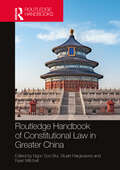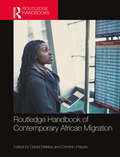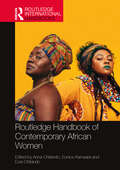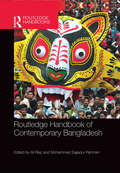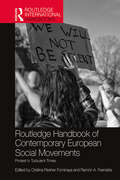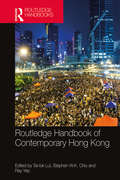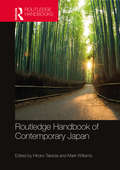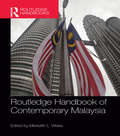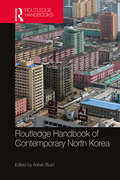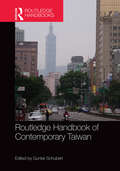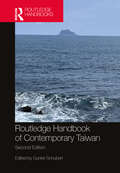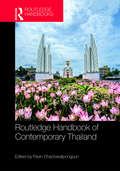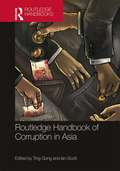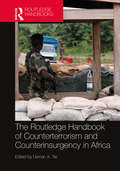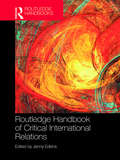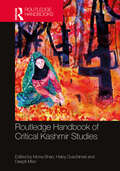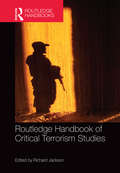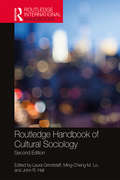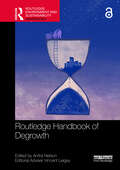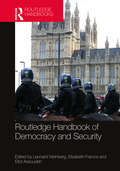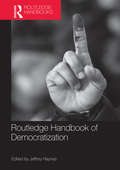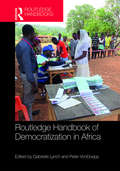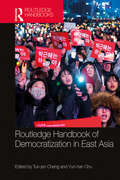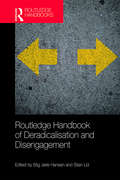- Table View
- List View
Routledge Handbook of Constitutional Law in Greater China
by Ryan Mitchell Ngoc Son Bui Stuart HargreavesThe Handbook of Constitutional Law in Greater China surveys important issues of constitutional law in Mainland China, Hong Kong, Macau, and Taiwan. It synthesizes existing scholarship, debates, and views on important constitutional issues in the four jurisdictions. Written by a range of scholars, it contributes to both national and comparative scholarship on constitutional law in these jurisdictions. The book includes four parts: Part I: History. This part explores the constitutional movement of the Qing dynasty; constitutional projects in modern China; and aspects of the drafting and implementation history of the Hong Kong and Macau Basic Laws. Part II: Structure. This part discusses the relationship between the party-state and the Chinese constitutional order; Chinese constitutionalism; constitutional aspects of city development under the SAR concept; constitutional review in Mainland China; a history of Taiwan’s ‘Council of Grand Justices’; and judicial review in both Hong Kong and Macau. Part III: Rights, Society, and Economy. This part deals with Hong Kong’s National Security Law and its impact on the ‘one country, two systems model’; social movements and constitutionalism; LGBT rights advocacy; the integration of capitalist regions within socialist China; the constitutional relevance of labour reforms in Mainland China; healthcare rights in both the Mainland and the SARS; and foreign investment under Art. 18 of the PRC Constitution. Part IV: Transnational Engagement. This part surveys comparative writings on China’s constitution; the influence of international human rights treaties on China’s constitutional order; the international dimension of Hong Kong’s constitutional order; and the changing role of the ‘overseas judges’ in Hong Kong. Exploring both historical and cutting-edge constitutional issues, this reference book is important reading for law researchers, lawyers, graduate students, undergraduates, and practitioners in the field of constitutional law and politics in Mainland China, Taiwan, Hong Kong, and Macau.
Routledge Handbook of Contemporary African Migration
by Daniel Makina and Dominic PasuraThis handbook provides an authoritative multidisciplinary overview of contemporary African international migration. It endeavours to present a single source of reference on issues such as migration history, trends, migrant profiles, narratives, migration-development nexus, migration governance, diasporas, impact of the COVID-19 pandemic, among others. The handbook assembles a multidisciplinary contributor team of distinguished and upcoming Africanist scholars, practitioners, researchers, and policy experts both inside and outside Africa to contribute their perspectives on contemporary African migration. It attempts to address some of the following pertinent questions: • What drives contemporary migration in Africa? • How are its patterns and trends evolving? • What is the architecture of migration governance in Africa? • How do migration, diaspora engagement and development play out in Africa? • What are the future trajectories of African migration? The handbook is a valuable resource for practitioners, politicians, researchers, university students, and academics interested in studying and understanding contemporary African migration.
Routledge Handbook of Contemporary African Women (Routledge International Handbooks)
by Ezra Chitando Anna Chitando Eunice KamaaraThe Routledge Handbook of Contemporary African Women highlights the achievements and progress being made by African women across a wide range of sectors in society. Without glossing over the very real challenges which women in Africa continue to face, this landmark handbook demonstrates how women across the continent are deploying their agency to achieve notable progress in areas as diverse as:• Pandemics• Climate Change• Science & Technology• Entrepreneurship• Higher Education• Youth & Older PeopleChallenging prevailing narratives and stereotypes about African women, this handbook provides a more positive perspective into African women’s progressive actions for sustainable development. It will be an essential read for readers across the fields of gender, environment, political science, history, development studies, religious studies and African Studies.
Routledge Handbook of Contemporary Bangladesh
by Ali Riaz Mohammad Sajjadur RahmanIn the past decade, Bangladesh has achieved significant social and economic progress. Despite high population density, a limited natural-resource base, underdeveloped infrastructure, frequent natural disasters and political uncertainty, the country has recorded positive developments in terms of broad economic and social indicators. This Handbook presents a comprehensive and interdisciplinary resource on the politics, society and economy of Bangladesh today. Divided into six thematic sections, the Handbook focuses on relevant issues and trends on: History and the making of contemporary Bangladesh Politics and institutions Economy and development Energy and environment State, society and rights Security and external relations Written by a team of international experts in the field, the chapters provide an accessible and up-to-date insight into contemporary Bangladesh. The Handbook will be of interest to students and academics of South Asian studies, as well as policymakers, journalists and others who wish to learn more about this increasingly important country.
Routledge Handbook of Contemporary European Social Movements: Protest in Turbulent Times (Routledge International Handbooks)
by Ramón A. Feenstra Cristina Flesher FominayaEuropean social movements have become increasingly visible in recent years, generating intense public debates. From anti-austerity and pro-democracy movements to right-wing nationalist movements, these movements expose core conflicts around European democracy, identity, politics and society. The Routledge Handbook of Contemporary European Social Movements offers a comprehensive interdisciplinary overview of the analysis of European social movements, helping to orient scholars and students navigating a rapidly evolving field while developing a new agenda for research in the area. The book is divided into eight sections: Visions of Europe; Contemporary models of democracy; Historical evolution of major European movements; Feminism and sexualities; Movement diffusion within and beyond Europe; Anti-austerity movements; Technopolitical and media movements; and Movements, parties and movement-parties. Key theories and empirical trajectories of core movements, their central issues, debates and impacts are covered, with a focus on how these have influenced and been influenced by their European context. Democracy, and how social movements understand it, renew it, or undermine it, forms a core thread that runs through the book. Written in a clear and direct style, the Handbook provides a key resource for students and scholars hoping to understand the key debates and innovations unfolding in the heart of European social movements and how these affect broader debates on such areas as democracy, human rights, the right to the city, feminism, neoliberalism, nationalism, migration and European values, identity and politics. Extensive references and sources will direct readers to areas of further study.
Routledge Handbook of Contemporary Hong Kong
by Tai-Lok Lui Stephen W.K. Chiu Ray YepWhen Britain and China negotiated the future of Hong Kong in the early 1980s, their primary concern was about maintaining the status quo. The rise of China in the last thirty years, however, has reshaped the Beijing-Hong Kong dynamic as new tensions and divisions have emerged. Thus, post-1997 Hong Kong is a case about a global city’s democratic transition within an authoritarian state. The Routledge Handbook of Contemporary Hong Kong introduces readers to these key social, economic, and political developments. Bringing together the work of leading researchers in the field, it focuses on the process of transition from a British colony to a Special Administrative Region under China’s sovereign rule. Organized thematically, the sections covered include: ‘One Country, Two Systems’ in practice Governance in post-colonial Hong Kong Social mobilization The changing social fabric of Hong Kong society Socio-economic development and regional integration The future of Hong Kong. This book provides a thorough introduction to Hong Kong today. As such, it will be invaluable to students and scholars of Hong Kong’s politics, culture and society. It will also be of interest to those studying Chinese political development and the impact of China’s rise more generally.
Routledge Handbook of Contemporary Japan
by Hiroko Takeda; Mark WilliamsThe Routledge Handbook of Contemporary Japan presents a synthesized, interdisciplinary study of contemporary Japan based on up-to-date theoretical models designed to provide readers with a comprehensive and full understanding of the dynamics of contemporary Japan. In order to achieve this, the Handbook is organized into two parts. Part I, ‘Foundations’, clarifies the state of contemporary Japan topic by topic by referring to the latest theoretical developments in the relevant disciplinary fields of politics, international relations, economy, society, culture and the personal. Part II, ‘Issues’, then offers a series of concrete analyses building upon the theoretical discussions introduced in Part I to help undergraduate and postgraduate students learn how to conduct independent analysis. Locating Japan in a comparative and interdisciplinary perspective, this Handbook is an essential resource for students and scholars interested in Japanese studies, Asian studies and global studies.
Routledge Handbook of Contemporary Malaysia
by Meredith L. WeissThe Routledge Handbook of Contemporary Malaysia offers a broad, analytical survey of Malaysia. It provides a comprehensive survey of significant topics in Malaysian politics, economy, and society today, focussing on issues, institutions, and trends. It is divided into four thematic sections, which are all introduced by the editor: • Domestic politics • Economics • Social policy and social development • International relations and security. The volume brings together an international team of experts: an interdisciplinary mix of forty contributors from Malaysia and elsewhere, including many of the leading specialists on Malaysian affairs. The chapters included in the volume form an accessible and fascinating window onto contemporary Malaysia. They each introduce a different aspect of the Malaysian polity, economy, or society, offering both historical perspective and a current assessment or investigation. Designed for general readers and specialists alike, chapters may be read individually -- each stands on its own -- or conjointly. Up-to-date, interdisciplinary, and academically rigorous, the Handbook will be of interest to students, academics, policymakers, and others in search of reliable information on Malaysian politics, economics, and society.
Routledge Handbook of Contemporary North Korea
by Adrian BuzoThe Routledge Handbook of Contemporary North Korea presents a comprehensive picture of contemporary North Korea, placed in historical context and set against the overlapping fields of politics, economy, culture, society and foreign relations. Spanning a period of significant transition for North Korea, this volume provides accurate analysis and applications of both historical and institutional perspectives. The volume’s chapters are representative of the growth in North Korean studies that has occurred since the 1990s, in parallel with the growing maturity of the field in South Korea, as well as with far greater levels of access to North Korean sources. The volume is divided into five Parts, each reflecting an emergent area of debate and research: The political perspective The North Korean economy Foreign relations Society Culture This is the first anthology of North Korean studies to demonstrate a clear understanding of North Korea as North Korea, as opposed to a dimly perceived and threatening rogue state. It features both Korean and non-Korean contributors, many working from primary source material. As such, this handbook will prove a valuable resource to students and scholars of Northeast Asian studies, modern Korean history and politics, and comparative politics more broadly.
Routledge Handbook of Contemporary Taiwan
by Gunter SchubertThe Routledge Handbook of Contemporary Taiwan offers a comprehensive overview of both contemporary Taiwan and the Taiwan studies field. Each contribution summarises the major findings in the field and highlights long-term trends, recent observations and possible future developments in Taiwan. Written by an international team of experts, the chapters included in the volume form an accessible and fascinating insight into contemporary Taiwan. Up-to-date, interdisciplinary, and academically rigorous, the Handbook will be of interest to students, academics, policymakers and others in search of reliable information on Taiwanese politics, economics, culture and society.
Routledge Handbook of Contemporary Taiwan
by Gunter SchubertThis fully revised 2nd edition of the Routledge Handbook of Contemporary Taiwan provides a comprehensive overview of both contemporary Taiwan and the Taiwan studies field.Written by an international team of Taiwan experts, the Handbook includes major topics in Taiwanese history, domestic politics, political economy, society, culture, and international relations. Each chapter summarises the major findings in the field and highlights long-term trends, recent observations, and potential future developments in Taiwan, revealing its long journey from a frontier island to a highly industrialised country struggling for international recognition.Up-to-date, interdisciplinary, and academically rigorous, the Handbook offers the reader an accessible and fascinating insight into contemporary Taiwan and will be of interest to students, academics, and policymakers with an interest in all things Taiwan.
Routledge Handbook of Contemporary Thailand
by Pavin ChachavalpongpunThe Routledge Handbook of Contemporary Thailand is a timely survey and assessment of the state of contemporary Thailand. While Thailand has changed much in the past decades, this handbook proposes that many of its problems have remained intact or even persistent, particularly problems related to domestic politics. It underlines emerging issues at this critical juncture in the kingdom and focuses on the history, politics, economy, society, culture, religion and international relations of the country. A multidisciplinary approach, with chapters written by experts on Thailand, this handbook is divided into the following sections. History Political and economic landscape Social development International relations Designed for academics, students, libraries, policymakers and general readers in the field of Asian studies, political science, economics and sociology, this invaluable reference work provides an up-to-date account of Thailand and initiates new discussion for future research activities.
Routledge Handbook of Corruption in Asia
by Ian Scott Ting GongCorruption in Asia ranges from the venal rent-seeking of local officials to the million-dollar bribes received by corrupt politicians; from excessive position-related consumption to future job offers in the private sector for compliant public servants; from money-laundering to ‘white elephant’ projects that do little more than line the pockets of developers and their political partners. The Routledge Handbook of Corruption in Asia addresses the theories, issues and trends in corruption and anticorruption reform that have emerged from this diverse experience. The book is divided into four major parts: corruption and the state; corruption and economic development; corruption and society; and controlling corruption: strategies, successes and failures. Chapters compare and contrast corruption in different social and institutional contexts, examine both successful and unsuccessful attempts to control it, and consider what lessons can be drawn from these Asian experiences. This academically rigorous and insightful book will be of interest to a wide range of students and scholars, particularly those of Asian studies, politics and sociology.
Routledge Handbook of Counterterrorism and Counterinsurgency in Africa
by Usman A. TarThis book illustrates how Africa’s defence and security domains have been radically altered by drastic changes in world politics and local ramifications. First, the contributions of numerous authors highlight the transnational dimensions of counterterrorism and counterinsurgency in Africa and reveal the roles played by African states and regional organisations in the global war on terror. Second, the volume critically evaluates the emerging regional architectures of countering terrorism, insurgency, and organised violence on the continent through the African Union Counterterrorism Framework (AU-CTF) and Regional Security Complexes (RSC). Third, the book sheds light on the counterterrorism and counterinsurgency (CT-COIN) structures and mechanisms established by specific African states to contain, degrade, and eliminate terrorism, insurgency, and organised violence on the continent, particularly the successes, constraints, and challenges of the emerging CT-COIN mechanisms. Finally, the volume highlights the entry of non-state actors – such as civil society, volunteer groups, private security companies, and defence contractors – into the theatre of counterterrorism and counterinsurgency in Africa through volunteerism, community support for state-led CT-COIN Operations, and civil-military cooperation (CIMIC). This book will be of use to students and scholars of security studies, African studies, international relations, and terrorism studies, and to practitioners of development, defence, security, and strategy.
Routledge Handbook of Critical International Relations
by Jenny EdkinsCritical international relations is both firmly established and rapidly expanding, and this Handbook offers a wide-ranging survey of contemporary research. It affords insights into exciting developments, more challenging issues and less prominent topics, examining debates around questions of imperialism, race, gender, ethics and aesthetics, and offering both an overview of the existing state of critical international politics and an agenda-setting collection that highlights emerging areas and fosters future research. Sections cover: critique and the discipline; relations beyond humanity; art and narrative; war, religion and security; otherness and diplomacy; spaces and times; resistance; and embodiment and intimacy. An international group of expert scholars, whose contributions are commissioned for the volume, provide chapters that facilitate teaching at advanced undergraduate and postgraduate level, inspire new generations of researchers in the field and promote collaboration, cross-fertilisation and inspiration across sub-fields often treated separately, such as feminism, postcolonialism and poststructuralism. The volume sees these strands as complementary not contradictory, and emphasises their shared political goals, shared theoretical resources and complementary empirical practices. Each chapter offers specific, focused, in-depth analysis that complements and exemplifies the broader coverage, making this Routledge Handbook of Critical International Relations essential reading for all students and scholars of international relations.
Routledge Handbook of Critical Kashmir Studies
by Deepti Misri Mona Bhan Haley DuschinskiThe Routledge Handbook of Critical Kashmir Studies presents emerging critical knowledge frameworks and perspectives that foreground situated histories and resistance practices to challenge colonial and postcolonial forms of governance and state building. It politicizes discourses of nationalism, patriotism, democracy, and liberalism, and it questions how these dominant globalist imaginaries and discourses serve institutionalized power, create hegemony, and normalize domination. In doing so, the handbook situates Critical Kashmir Studies scholarship within global scholarly conversations on nationalism, sovereignty, indigenous movements, human rights, and international law. The handbook is organized into the following five parts: • Territories, Homelands, Borders • Militarism, Humanism, Occupation • Memories, Futures, Imaginations • Religion, History, Politics • Armed Conflict, Global War, Transnational Solidarities A comprehensive reference work documenting and consolidating the growing Critical Kashmir Studies scholarship, this handbook will be of interest to scholars of anthropology, political science, cultural studies, legal and sociolegal studies, sociology, history, critical Indigenous studies, settler colonial studies, and feminist studies.
Routledge Handbook of Critical Terrorism Studies
by Richard JacksonThis new handbook is a comprehensive collection of cutting-edge essays that investigate the contribution of Critical Terrorism Studies to our understanding of contemporary terrorism and counterterrorism. Terrorism remains one of the most important security and political issues of our time. After 9/11, Critical Terrorism Studies (CTS) emerged as an alternative approach to the mainstream study of terrorism and counterterrorism, one which combined innovative methods with a searching critique of the abuses of the war on terror. This volume explores the unique contribution of CTS to our understanding of contemporary non-state violence and the state’s response to it. It draws together contributions from key thinkers in the field who explore critical questions around the nature and study of terrorism, the causes of terrorism, state terrorism, responses to terrorism, the war on terror, and emerging issues in terrorism research. Covering a wide range of topics including key debates in the field and emerging issues, the Routledge Handbook of Critical Terrorism Studies will set a benchmark for future research on terrorism and the response to it. This handbook will be of great interest to students of terrorism studies, political violence, critical security studies and IR in general.
Routledge Handbook of Cultural Sociology: 2nd Edition (Routledge International Handbooks)
by John R. Hall Laura Grindstaff Ming-Cheng M. LoThe thoroughly revised and updated second edition of the Routledge Handbook of Cultural Sociology provides an unparalleled overview of sociological and related scholarship on the complex relations of culture to social structures and everyday life. With 70 essays written by scholars from around the world, the book brings diverse approaches into dialogue, charting new pathways for understanding culture in our global era. Short, accessible chapters by contributing authors address classic questions, emergent issues, and new scholarship on topics ranging from cultural and social theory to politics and the state, social stratification, identity, community, aesthetics, and social and cultural movements. In addition, contributors explore developments central to the constitution and reproduction of culture, such as power, technology, and the organization of work. This handbook is essential reading for undergraduate and postgraduate students interested in a wide range of subfields within sociology, as well as cultural studies, media and communication, and postcolonial theory.
Routledge Handbook of Defence Studies
by David J. Galbreath John R. DeniThe Routledge Handbook of Defence Studies provides a comprehensive collection of essays on contemporary defence studies by leading international scholars. Defence studies is a multi-disciplinary study of how agents, predominantly states, prepare for and go to war. Whereas security studies has been broadened and stretched to cover at times the near totality of international and domestic affairs, and war studies has come to mean not just operations and tactics but also experiences and outcomes, defence studies remains a coherent area of study primarily aimed at how defence policy changes over time and in relation to stimulating factors such as alterations in power, strategy and technology. This new Handbook offers a complete landscape of this area of study and contributes to a review of defence studies in terms of policy, security and war, but also looks forward to new challenges to existing conceptions of defence and how this is changing as states and their militaries also change. The volume is divided into four thematic sections: Defence as Policy; Defence Practice; Operations and Tactics; and Contemporary Defence Issues. The ability to review the field while also looking forward to further research is an important element of a sustainable text on defence studies. In as much as this volume is able to highlight the main themes of defence studies, it also offers an in-depth look into how defence issues can be examined and compared in a contemporary setting. This Handbook will be of great interest to students of defence studies, strategic studies, war studies, security studies and IR.
Routledge Handbook of Degrowth (Routledge Environment and Sustainability Handbooks)
by Anitra Nelson Vincent LiegeyThis handbook takes stock of ‘degrowth’, a concept and movement gaining increasing visibility in the 2020s. Contributors explain contexts for degrowth’s significance, elaborate its diverse history and detail its unique approaches, practices, challenges and potential futures. Part I sets the ecological, economic and political contexts framing degrowth’s evolution as a significant concept for societies facing the challenges of deepening socio-political inequities and ecological unsustainabilities. Part II identifies themes characterising degrowth movements in a sample of distinctive countries, starting with its origins in France. Part III shows degrowth ‘concepts in action’, explaining in practical ways the meanings of terms such as ‘conviviality’, ‘degrowth doughnut’, ‘frugal abundance’, ‘commoning’ and ‘defashioning’. Part IV offers analyses and forward-looking imaginaries for degrowth from the perspectives of distinctive agents, agendas and theoretical frameworks. Contributors engage with topics such as ecofeminist futures, utopian thought and show how degrowth is necessary to address poverty.Highly experienced and knowledgeable contributors from varied scholarly and practitioner fields address a range of strategic, activist, policy and research questions in this handbook. Grounded in empirical cases, they identify significant social and ecological challenges, relevant to students, researchers, activists, policymakers and practitioners at various levels within the wide range of fields in which degrowth can be applied.
Routledge Handbook of Democracy and Security
by Leonard Weinberg, Elizabeth Francis and Eliot AssoudehThis handbook explores how democracies around the world seek to balance democratic values with the requirement to protect their citizens from the threat of politically motivated violence. Over the past few decades, the majority of the world’s democracies have had to confront serious security threats, and in many instances these challenges have not come from rival states but from violent groups. This volume offers readers an overview of how some democracies have responded to such threats. It examines the extent to which authorities have felt compelled to modify laws to evade what would ordinarily be regarded as protected rights, such as personal privacy, freedom of movement and freedom of speech. Grounded in historical analysis, each of the sections addresses past and emerging security threats; legal and legislative responses to them; successful and unsuccessful efforts to reconcile democracy and security; and a range of theoretical questions. The case studies provided vary in terms of the durability of their democratic systems, level of economic development and the severity of the threats with which they have been confronted. The volume is divided into three thematic parts: Strong democracies: United States, Great Britain, France, Germany, Italy, Spain, Australia, New Zealand and Israel Challenged democracies: India, South Africa, Brazil, Argentina and Romania Fragile democracies: the Philippines and Nigeria. This book will be of much interest to students of democracy, security studies, political philosophy, Asian politics, Middle Eastern politics, African politics, West European politics and IR in general.
Routledge Handbook of Democratization
by Jeffrey HaynesThis exciting new handbook provides a global overview of the process of democratization, offering chapter by chapter discussion at both the country and regional levels and examining the interaction between the domestic and external factors that affect the progression of countries from authoritarian to democratic rule. Bringing together 29 key experts in the field, the work is designed to contrast the processes and outcomes of democratic reform in a wide range of different societies, evaluating the influence of factors such as religion, economic development, and financial resources. It is structured thematically into four broad sections: Section I provides a regional tour d’horizon of the current state of democratisation and democracy in eight regions around the world Section II examines key structures, processes and outcomes of democratisation and democracy Section III focuses on the relationship between democratisation and international relations through examination of a range of issues and actors including: the third and fourth waves of democracy, political conditionality, the United Nations, the European Union, the African Union and the Organisation of African States Section IV Examines the interaction between democratisation and development with a focus on poverty and inequality, security, human rights, gender, war, and conflict resolution. A comprehensive survey of democratization across the world, this work will be essential reading for scholars and policy-makers alike.
Routledge Handbook of Democratization in Africa
by Gabrielle Lynch Peter VondoeppThis volume explores the issues and debates surrounding the ongoing processes of democratization in sub-Saharan Africa, illuminating the central dynamics characterizing Africa’s democratic experiments, and considering the connections between democratization and economic, social, and cultural developments on the continent. Reflecting the diverse and rich nature of this field of study, the Handbook of Democratization in Africa features more than thirty contributions structured into six thematic sections: The politics and paths of regime development Institutional dynamics Political mobilization and voting dynamics The politics of identity Social forces from below The consequences of democracy. Chapters offer overviews of the key scholarship on particular topics, including central insights from the latest research, and provide suggestions for those interested in further inquiry. The material includes attention to broad cross-continental patterns, for example with respect to public opinion, political violence, or the role of different institutions and actors. It also includes rich case material, drawing on and highlighting the experiences of a diverse collection of countries. Encouraging a comprehensive view of key concerns and enhancing understanding of particular issues, the Handbook of Democratization in Africa represents a critical resource for experts and students of African politics, democratization, and African studies.
Routledge Handbook of Democratization in East Asia
by Yun-Han Chu Tun-Jen ChengThis handbook provides a comprehensive analysis of the dynamics and prospects of democratization in East Asia. A team of leading experts in the field offers discussion at both the country and regional level, including analysis of democratic attitudes and movements in China, Japan, South Korea, and Taiwan. Evaluating all the key components of regime evolution, from citizen politics to democratic institutions, the sections covered include: • Regional Trends and Country Overviews • Institutions, Elections, and Political Parties • Democratic Citizenship • Democratic Governance • The Political Economy of Democratization Examining the challenges that East Asian emerging democracies still face today, as well as the prospects of the region's authoritarian regimes, the Routledge Handbook of Democratization in East Asia will be useful for students and scholars of East Asian Politics, Comparative Politics, and Asian Studies.
Routledge Handbook of Deradicalisation and Disengagement
by Stig Jarle Hansen Stian LidThe Routledge Handbook of Deradicalisation and Disengagement offers an overview of the historical settings, theoretical debates, national approaches and practical strategies to deradicalisation and disengagement. Radicalisation and violent extremism are major global challenges, and as new and violent extremist groups and environments emerge, there is an increasing need for knowledge about how individuals physically exit these movements and how to change their mindset. Historically, much of the focus on these topics has been highly securitised and militarised; by contrast, this volume explores the need for more community-based and ‘soft’ approaches. The handbook includes discussions from both right-wing/left-wing political and religiously inspired deradicalisation processes. The handbook is organised into three parts: 1 definitions, backgrounds and theories; 2 actors; 3 regional case studies. This handbook will be of much interest to students, researchers, scholars and professionals of deradicalisation, counterterrorism, political violence, political extremism, security studies and international relations in general.
